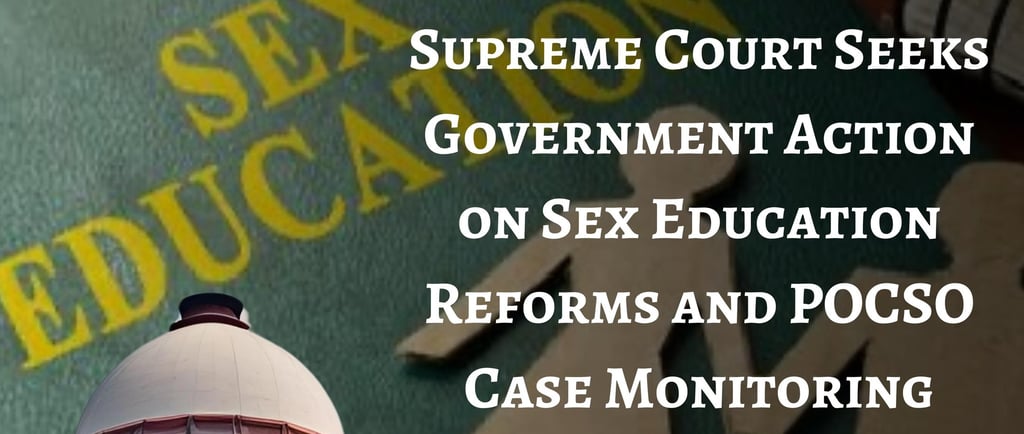Supreme Court Seeks Government Action on Sex Education Reforms and POCSO Case Monitoring Following Unique Sentencing Decision
New Delhi, May 2025 – In a landmark development, the Supreme Court of India has called on the Central Government to respond to a series of reformative suggestions proposed by amici curiae regarding adolescent sexuality education and the real-time tracking of cases under the Protection of Children from Sexual Offences (POCSO) Act, 2012. The recommendations aim to modernize sex education policies, enhance institutional accountability, and ensure a more nuanced legal approach in cases involving consensual adolescent relationships.
5/26/20252 min read


The matter arose from a peculiar case involving the conviction of a man under the POCSO Act. Notably, the victim—who was a minor at the time of the incident but is now an adult—was married to the convict and has a child with him. She expressed her wish that the man not be sentenced, as it would dismantle her family. Recognizing the unique circumstances, a Supreme Court bench comprising Justices Abhay S. Oka and Ujjal Bhuyan upheld the conviction but refrained from sentencing the accused, invoking its extraordinary powers under Article 142 of the Constitution to deliver complete justice.
Senior Advocates Madhavi Divan and Liz Mathew, serving as amici curiae, submitted that rigid enforcement of the POCSO Act in consensual adolescent relationships often leads to unjust outcomes, particularly when the prosecutrix does not view the incident as exploitative. Citing precedents from the Delhi, Madras, and Calcutta High Courts, they argued for a more balanced interpretation that distinguishes between exploitative abuse and consensual adolescent intimacy.
Beyond this individual case, the amici curiae made broader policy suggestions. Drawing from the 2021 UNESCO Global Status Report on comprehensive sexuality education, they emphasized that India’s current policies on sex education—limited to secondary school levels and focused on HIV awareness—are insufficient. They recommended a shift toward a comprehensive and age-appropriate sex education curriculum, along with systematic reforms in teacher training and curriculum development to address misinformation, stigma, and adolescent health challenges.
To bolster policy implementation and transparency, they proposed the establishment of a real-time data collection and monitoring system. This would include key indicators such as sex education outreach, access to counseling, POCSO case status, and child marriage trends. A centralized dashboard could ensure better accountability and more responsive governance.
Taking note of the recommendations, the Court directed the Ministry of Women and Child Development to form an expert committee, comprising senior officers and subject-matter specialists, to evaluate and act on the suggestions. The Committee has been instructed to submit a detailed report to the Court by July 25, 2025.
The backdrop of the proceedings is a suo motu case initiated by the Supreme Court after the Calcutta High Court issued controversial remarks while acquitting a man under POCSO. The High Court’s statements—advising adolescent girls to control their sexual urges—prompted nationwide concern. On August 20, 2024, the Supreme Court overturned the acquittal, restored the conviction under Section 6 of the POCSO Act and IPC Sections 376(3) and 376(2)(n), and issued guidelines for judgment writing and judicial sensitivity.
The Court also directed the Government of West Bengal to establish a separate expert committee to support the victim, ensure her access to welfare benefits, and help her make informed decisions about her future. Further directions were issued to all states and Union Territories to enforce compliance with Section 19(6) of the POCSO Act and provisions of the Juvenile Justice (Care and Protection of Children) Act, 2015, including drafting necessary rules and submitting reports to the Ministry.
In its latest hearings, the Court noted the need for financial assistance for the victim and suggested exploring vocational training or part-time employment opportunities following her 10th-grade exams, with help from the West Bengal State Legal Services Authority.
The Supreme Court’s initiative marks a critical step toward reforming how the justice system addresses adolescent sexuality and safeguards the rights of victims, especially in cases where legal outcomes may conflict with the welfare of those they aim to protect.
